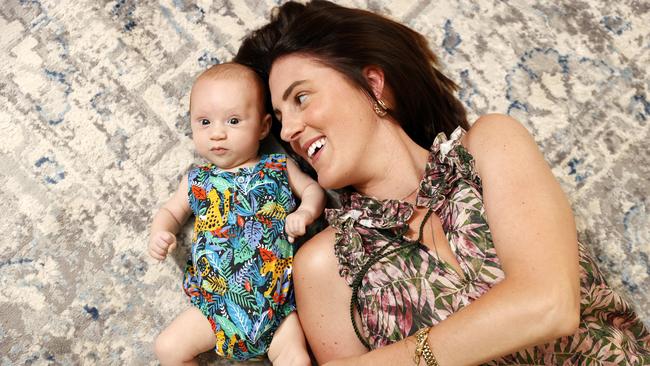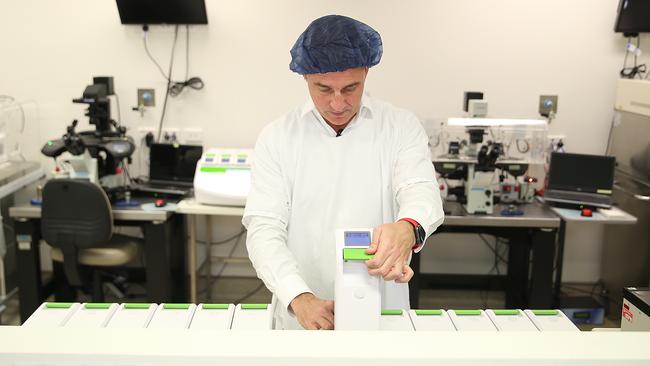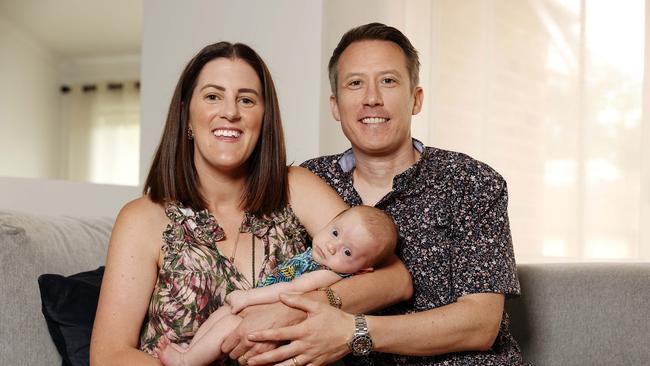Study reveals 1 in 20 pregnant mums risk miscarriage with invasive DNA tests
A non-invasive blood test could save pregnant mums the stress and miscarriage risk of further DNA testing by minimising false positives.
NSW
Don't miss out on the headlines from NSW. Followed categories will be added to My News.
A new study shows as many as one in 20 pregnant women could be risking miscarriage by having unnecessary invasive testing of their baby, when safer options are available.
A study of 1000 pregnant women conducted by IVF group Genea offered pregnant women a non-invasive prenatal screening (NIPS) blood test, which analyses foetal DNA and compared it to traditional screening done at 12 weeks.
Traditional screening includes a nuchal translucency ultrasound and serum test. Screening tests highlight risk but are not definitive and one in 20 can be a false positive. If the risk is deemed high, more invasive tests will be considered.

The clinical trial found that, of the 1000 patients, 40 women would have been incorrectly classified as high risk of a chromosomal abnormality like Down syndrome and referred on for either Chorionic Villus Sampling (CVS) or amniocentesis.
CVS involves taking a piece of placenta for analysis and carries a one in 100 risk of miscarriage. Amniocentesis involves a needle taking a sample of amniotic fluid surrounding the baby and carries a one in 200 risk of miscarriage.
Medicare data show that 1019 amniocentesis were conducted from 2020 to June 2021, as well as 484 CVS procedures. The risk rate indicates about 148 pregnancies would have miscarried as a result of the tests.
With an accuracy of 99.5 per cent, the NIPS GeneSyte test conducted at 10 weeks gestation revealed all 40 babies highlighted as high risk by traditional screening were in fact chromosomally normal and therefore did not need the more risky CVS or amniocentesis.
“NIPS enables scientists to analyse the actual chromosomes of the foetus, providing more accuracy,” Genea fertility specialist Dr Cheryl Phua said.

These non-invasive tests are now widely available and are more accurate than traditional screening methods.
Small amounts of the baby’s DNA enter the mother’s bloodstream and NIPS can screen the DNA for chromosomal abnormalities.
Only five women out of the 1000 needed to proceed to invasive diagnostic testing to confirm the results.
“This is one of the most definitive studies conducted into prenatal genetic testing and has significant implications on the long-term management and care of pregnancies,” Genea scientific director Steven McArthur said. “It’s the first real study that has looked at the ability of the NIPS to reduce the use of CVS or amniocentesis in pregnancy.”

Emily Hurst from Glen Alpine underwent IVF at Genea Fertility in 2021 and after two cycles fell pregnant with baby Hudson, who is now 11 weeks old.
Ms Hurst chose to have NIPS at 10 weeks into her pregnancy.
“I took up the testing just to check really,” she said.
“It made sense to do the genetic testing just for my piece of mind and if there was anything wrong, I could find out earlier. It was risk-free and just a normal blood test.
‘Early pregnancy is a very anxious time for most women. Women just want reassuring information as early as possible and personally I was grateful for the NIPS test to reduce risking an invasive procedure later in my pregnancy.”




